

Zitierweise / cite as:
Payer, Alois <1944 - >: Dharmashastra : Einführung und Überblick. -- 11. Essensvorschriften und Essenstabus. -- 5. Bußen für Vergehen gegen Essensvorschriften. -- Fassung vom 2004-03-07. -- URL: http://www.payer.de/dharmashastra/dharmash115.htm -- [Stichwort].
Erstmals publiziert: 2004-03-07
Überarbeitungen:
Anlass: Lehrveranstaltung 2003/04
Unterrichtsmaterialien (gemäß § 46 (1) UrhG)
©opyright: Dieser Text steht der Allgemeinheit zur Verfügung. Eine Verwertung in Publikationen, die über übliche Zitate hinausgeht, bedarf der ausdrücklichen Genehmigung der Herausgeberin.
Dieser Teil ist ein Kapitel von:
Payer, Alois <1944 - >: Dharmashastra : Einführung und Übersicht. -- http://www.payer.de/dharmashastra/dharmash00.htm
Dieser Text ist Teil der Abteilung Sanskrit von Tüpfli's Global Village Library
Als Einleitung zum Thema Bußen (prâyashcitta) die folgenden Ausführungen von Julius Jolly <1849 - 1932>:

Abb.: Julius Jolly <1849 - 1932>
Jolly, Julius <1849 - 1932>: Recht und Sitte (einschließlich der einheimischen Litteratur). -- Straßburg : Trübner, 1896. -- (Grundriss der Indo-arischen Philologie und Altertumskunde ; Bd. 2, H. 8). -- S. 117 - 121
"§ 37. Die Bußen. Ebenso alt als die Sündenregister ist die Lehre von den Bußen (prâyashcitta), deren Festsetzung und Verhängung eines der wesentlichsten Mittel für die Behauptung des Einflusses der Brahmanen und häufig auch eine ergiebige Einnahmsquelle für dieselben bildete. Es ist nicht unwahrscheinlich, dass das Prinzip der geistlichen Strafen schon in die indoiranische Epoche zurückgeht, da die häufige Anwendung von Gebeten, Geschenken jeder Art an die Priester und Kuhurin bei Sühnungen auch im Vendidâd auftritt. Auf indischem Boden scheint das schon erwähnte Sâmavidhânabrâhmana die älteste eingehende Darstellung der Bußen zu enthalten. Seinem Zusammenhang mit dem Sâmaveda entsprechend erwähnt es namentlich viele Sâmans, deren Absingung eine bußkräftige Wirkung haben soll, beschreibt aber in I, 3 auch die drei Kasteiungen (krcchra). Das krcchra im engern Sinn besteht darin, dass man die ersten drei Tage lang nur Morgens ungewürzte Speise genießt, an den drei nächsten Tagen ebenso nur Abends, an drei weiteren Tagen nur unerbetene Speise genießt, an den drei letzten Tagen aber ganz fastet Eine Steigerung dieser Buße ist das atikrcchra, bei dem man bei jeder Mahlzeit nur soviel gemessen darf, als man auf einmal in den Mund nehmen kann; als der Gipfelpunkt der Kasteiung aber ist das krcchrâtikrcchra anzusehen, bei dem man nur von Wasser leben darf.
Von den Smrtis hat Gautama 26 die drei krcchra wörtlich aus dem Sâmaveda übernommen, und sie kommen auch in anderen Werken vor, namentlich das krcchra im engeren Sinn, das aber gewöhnlich prâjâpatya, die von Prajâpati erfundene Buße heißt.
Andere krcchra sind:
- die heiße Buße (taptakrcchra), bei der man je drei Tage lang nur heißes Wasser, heiße Milch und heiße zerlassene Butter genießt und die drei letzten Tage ganz fastet;
- die kalte Buße (shîtakrcchra), bei der man die nämlichen Flüssigkeiten kalt genießt,
- die Blätterbuße (parnakrcchra),
- Wasserbuße (udakakrcchra),
- Wurzelbuße (mûlakrcchra),
- Viertelsbuße (pâdakrcchrâ) u. a.
(Vishnu 46, 10—23 u. a.).
Hervorzuheben ist ferner die Mondbuße der Smrtis (auch Mahâbhârata 12, 165, 69) mit ihren Abarten yati-, shishu-, sâmânyacândrâyana, so genannt, weil man mit dem ab- und zunehmenden Mond täglich seine Nahrung vermindert resp. vermehrt (Vishnu 47 u. a.).
Die Parâkabuße besteht in zwölftägigem vollständigen Fasten (Y. 3, 321 u. a.).
Bei der Buße sâmtapana, die in verstärkter Form mahâsâmtapana genannt wird, darf man einen Tag lang nur Kuhurin, Kuhmist, Milch, saure Milch, zerlassene Butter und eine Brühe von Kushagras genießen und muss den zweiten Tag fasten (Yâjnavalkya 3, 315 f. u. a.).
Die hier erwähnten »fünf Dinge von der Kuh« (pancagavyâ) kommen auch bei andern Bußen vor, und so kann überhaupt alles, was von diesem heiligen Tier herrührt, auch wenn es an und für sich noch so unrein ist, als Reinigungs- und Sühnemittel dienen.
Bei dem govrata (Vishnu 50, 24 u. a.), der Buße für die Tötung einer Kuh, soll man die Kühe auf die Weide begleiten und sie auf jede Weise bedienen, den von ihnen erregten Staub einschlürfen, sie bei Unwetter und Gefahr mit Preisgebung des eigenen Lebens in Sicherheit bringen und von nichts als pancagavya leben.
Selbst wenn man nur einer Kuh den Rücken kratzt oder sich mit den von ihren Hörnern herabfallenden Wassertropfen benetzt, kann man dadurch eine sühnende Wirkung erzielen (Vishnu 23, 59 f.).
Eine noch wichtigere Rolle als der Kultus der Kuh spielen bei den Bußen die Gebete, unter denen besonders die Sâmans hervortreten, auf deren bußkräftige Wirkung schon das Sâmav. hinweist. Die wichtigsten Gebete haben besondere Namen (Vishnu 56 u. a.). Je öfter man sie wiederholt, desto größere Wirkungen erzielt man damit; so kann nach Baudhâyana 4, 5, 31, wer beim Sonnenaufgang 1008 mal die Gâyatrî murmelt, dadurch Befreiung von allen Sünden mit Ausnahme des Brahmanenmords erlangen. Häufig wird das Hersagen von Gebeten mit andern Observanzen kombiniert, so z. B. bei dem anashnat-pârâyana, der mit Fasten u. a. Kasteiungen verbundenen Rezitation des ganzen Veda (Baudh. 3, 9).
Eine andere, den Verfassern der Smrtis natürlich besonders sympathische Art der Sühnung besteht in Geschenken, die den Brahmanen gegeben werden. Als passende Gegenstände für Geschenke nennt Baudhâyana 3, 10, 14 im Allgemeinen Gold, Kühe, Kleider, Land, Sesam, zerlassene Butter und Speise, Gautama 19, 16 außerdem noch Pferde, es werden aber bei den einzelnen Vergehen noch viele zur Sühnung derselben geeignete Geschenke namhaft gemacht. So wird bei den Bußen für die Tötung von Tieren bestimmt, dass man für eine getötete Schlange einen eisernen Spaten geben soll, für einen Eber einen Topf zerlassene Butter, für ein Rebhuhn einen drona Sesam, für einen Papagei ein zweijähriges Kalb, für einen Pfau u. a. Vögel oder für einen Affen eine Kuh, für ein Pferd ein Kleid, für einen Elefanten fünf dunkelfarbige Stiere, für einen Esel ein einjähriges Kalb, für ein Kamel einen krshnala Gold, für ein Raubtier eine Milchkuh, für Entwendung von Gold eines Brahmanen ebensoviel Gold als man selbst wiegt u. dgl. (Vishnu 50, 25 ff. u. a.).
Dass diese Geschenke für Brahmanen bestimmt sind, in erster Linie wohl für den âcârya, der die Buße diktiert hat, wird zwar nur an einigen Stellen (Vishnu 50, 31, 33; M. 11, 131 u. a.) ausdrücklich gesagt, ergibt sich aber aus dem Zusammenhang.
Bei Baudhâyana 1, 19, 6 werden allerdings die Sühngeschenke für die Tötung eines Schwans u. a. Tiere der Entschädigung gleichgestellt, die für den Totschlag eines Shûdra zu entrichten ist, und die Quelle der sehr bedeutenden, bis zu 1000 Kühen gehenden Bußen, die für Tötung eines Menschen zu leisten sind, ist jedenfalls in dem Wergeld zu suchen (§ 44).
Doch treten Schenkungen und Stiftungen jeder Art von Anfang an in dem religiösen Recht sehr bedeutsam hervor, vgl. § 30.
Andere Sühnemittel sind:
- der Besuch von Wallfahrtsorten (tîrtha), deren Vishnu 85 allein 51 aus allen Teilen Indiens aufzählt,
- ein Bettelleben, wobei man sich nur durch Almosen erhält,
- Baden, besonders mit den Kleidern,
- Opfer,
- auf dem Boden zu schlafen,
- in der Sonne zu sitzen,
- Scheren der Haare,
- Wohnen im Walde,
- demütige Entschuldigungen und Verneigungen
- u. s. w.
Eine besondere Kategorie bilden die Bußen für heimliche Vergehen (rahasyaprâyashcitta); diese zumeist in Gebeten bestehenden Bußen soll nach Mitâksharâ zu Yâjnavalkya 3, 301 ein mit dem dharmashâstra vertrauter Sünder sich selbst auferlegen, ein ungelehrter dagegen soll sich an einen Sachverständigen wenden und unter dem Vorgeben, dass irgend ein Anderer die betreffende Sünde begangen habe, die dafür geeignete Buße zu erkunden suchen.
Je schwerer die Sünde, desto schwerer die Buße; daher kann die Begehung einer Todsünde nur durch Selbstmord gesühnt werden. Nach Mahâbhârata 12, 165,46 ff. soll der Mörder eines gelehrten Brahmanen (bhrûnahan) sich in das Kampfgetümmel begeben, um durch den Tod von Feindeshand Absolution zu erlangen, oder sich in das Feuer stürzen. Wer ein berauschendes Getränk getrunken hat, wird rein wenn er so lange heißes Wasser genießt, bis er durch Verbrühung den Tod findet. Wer das Ehebett seines Lehrers befleckt hat, soll eine aus Eisen geformte, glühend gemachte Frau umarmen, bis er daran zu Grunde geht, oder sein Glied und seine Hoden abschneiden und diese abgeschnittenen Körperteile in der Hand tragend so lange nach Südwesten vorwärts schreiten, bis er tot zu Boden stürzt, oder er soll sein Leben lassen, indem er einen Brahmanen aus Todesgefahr errettet.
Doch werden neben diesen tödlichen Bußen fakultativ auch gelindere zugelassen, wie z. B. der Genuss von Spirituosen auch durch Fasten, Keuschheit und Schlafen auf der Erde gesühnt werden kann.
Obige und ähnliche Arten des Selbstmords zur Abbüssung von Todsünden kommen auch in den meisten Smrtis vor, doch werden späterhin die zum Tod führenden Bußen unter den im jetzigen Weltalter nicht mehr zulässigen Gebräuchen (kalivarjya) aufgezählt.
Im Übrigen zeigen sich die späteren Smrtis bestrebt, Lücken in der Lehre von den Bußen auszufüllen und die Kasuistik weiter auszubilden. So wird nun neben der Tötung einer Kuh auch der Fall einer mehr oder minder schweren Verletzung derselben in Betracht gezogen. Haben Kinder, Frauen oder Kranke sich vergangen, so sollen sie die entsprechende Buße nur halb vollziehen. Die zu konsultierenden Brahmanen sollen ihr Gutachten über das für den betreffenden Fall geeignete prâyashcitta schriftlich abgeben (Brhaspati, Kâty. u. a.). Die Bußen können allgemein in Geld und Geldeswert verwandelt werden.
Schon Alberûnî 2, 172 f. erwähnt die Fastengelübde krcchra, parâka, cândrâyana u. a.
Auch heutzutage sind für die Bußen, die noch immer von rechtsgelehrten Brahmanen {dharmâdhikârin), meist in schriftlichen Gutachten, festgesetzt werden, die Grundsätze des dharmashâstra in Geltung geblieben. Am allgemeinsten finden sich Geldstrafen oder Geschenke, sei es, dass dieselben direkt eingetrieben werden, oder dass, was das Gewöhnliche ist, der zu Büssende den sämtlichen Mitgliedern seiner Kaste ein Gastmahl mit vorgeschriebener Bewirtung geben muss. Doch spielt auch das pancagavya und überhaupt der Kultus der Kuh noch eine bedeutende Rolle bei religiösen Sühnungen, wie u. a. Dubois berichtet, der auch von einer mit dem govrata der Smrtis vergleichbaren Observanz erzählt, wobei man die Kühe auf der Weide begleitet und ihren Urin in eigens dazu mitgebrachten Gefäßen auffängt. Für schwerere Vergehen gelten Wallfahrten (tîrthayâtrâ) als die geeignete Sühne. Auch die rahasyaprâyashcitta, entweder von dem Schuldigen selbst oder von dem Familienhaupt festgesetzt, kommen wenigstens in Kaschmir noch vor.
§ 38. Ausstoßung aus der Kaste. Der Vollbringung der vorgeschriebenen Bußen kann sich Niemand entziehen, der nicht Gefahr laufen will aus seiner Kaste ausgestoßen zu werden.
Der Hergang bei der Ausstoßung (tyâga), die in dem gefürchteten Umwerfen oder Zerbrechen des Wassertopfs (ghataparyasana, ghatasphota) ihr sichtbares Zeichen hat und den davon Betroffenen zu einem Gefallenen (patita) und dadurch völlig Rechtlosen macht, ist nach Manu 11, 183—188 nebst Parallelstellen und Kommentaren etwa folgender.
Hat Jemand eine schwere Sünde (mahâpâtaka) begangen und ist deshalb bei seinem Guru, seinen Verwandten oder dem König verklagt worden, so wird er, wenn er ein Geständnis ablegt, aufgefordert einen âcârya anzunehmen, der die entsprechende Buße bestimmen soll. Weigert er sich dieser Aufforderung nachzukommen oder die verhängte Buße zu vollziehen, so findet die Zeremonie der Umstürzung des Wassertopfs statt. Seine Verwandten und geistlichen Lehrer halten an einem unglückverheißenden Tag eine Versammlung, bei der sie, gerade als ob er gestorben wäre, alle Bestattungszeremonien, von der Wasserspende angefangen, für ihn vollziehen. Hierauf bringt ein Sklave oder Diener, oder ein Verwandter von niedriger Herkunft, aus einem Kehrichthaufen einen zerbrochenen Topf oder eine unreine Schüssel herbei, füllt sie aus dem Wassertopf einer Sklavin mit Wasser und stößt sie mit dem linken Fuß um, wobei die Verwandten des Auszustoßenden, nachdem sie ihre Haare aufgelöst, ihn berühren; oder die Sklavin oder die Verwandten selbst besorgen das Umstoßen des Topfes. Bei diesem Akt wird der Name des Auszustoßenden ausgerufen und gesagt, dass die Spende für ihn bestimmt ist und man ihm für die Zukunft das Wasser entzieht (anudakam karomi). Beim Verlassen der Stätte sollen die Verwandten zum Zeichen ihrer Geringschätzung derselben ihre linke Seite zuwenden, dann nach einem Bad nach Hause gehen.
Fortan ist es verboten, mit dem Ausgestoßenen zu sprechen, neben ihm zu sitzen, oder irgendwie mit ihm zu verkehren; wer doch mit ihm spricht, muss Buße tun, und wer ein Jahr lang fortgesetzt mit ihm verkehrt, wird selbst ausgestoßen. Der patita ist von allen religiösen Gebräuchen und den Beschäftigungen seiner Kaste ausgeschlossen, ja er wird enterbt (vgl. § 24) und geht, wenn er der älteste Bruder ist, der Primogenitur und der damit verbundenen Vorrechte verlustig. Nach seinem Tod kommt er in die Hölle {Gautama 21, 6), auch empfängt er keine Totenopfer, sondern anstatt der Totenspende stößt an seinem Todestag eine Sklavin einen Krug mit Wasser um, mit den Worten »Trink du dies« {Vishnu 22, 57).
Ausgestoßene Frauen sind ebenso wie die Männer zu behandeln, doch soll man ihnen Unterhalt reichen und eine Wohnung in der Nähe des Familienhauses anweisen (Yâjnavalkya 3, 297 u. a., vgl. § 19).
Die Wiederaufnahme des Ausgestoßenen in seine Kaste kann auf Beschluss derselben in dem Fall erfolgen, dass er die vorgeschriebenen Bußen vollzogen hat. Es finden dann Zeremonien statt, die das genaue Gegenstück zu den Ausstoßungsgebräuchen bilden. Man holt einen neuen Topf von Thon oder von Gold, füllt ihn mit Wasser aus einem heiligen Teich oder Fluss und wirft ihn um oder gießt ihn über dem Ausgestoßenen aus, während auch seine Verwandten in dem nämlichen Wasser baden. Sprüche aus dem Veda, Geschenke an Brahmanen und die gleichen Feierlichkeiten wie bei der Weihung eines Neugeborenen begleiten die heilige Handlung. Doch soll, ehe der Ausgestoßene wieder zu Gnaden aufgenommen wird, noch eine Probe stattfinden, indem er Kühen Gras zum Futter vorwirft; erst wenn die Kühe davon gefressen haben, gilt er wieder für gesellschaftsfähig (Yâjnavalkya 3, 300; M. 11, 197).
Nach seiner Wiederaufnahme in die Kaste darf man ihn nicht mehr zurücksetzen, sondern muss in jeder Weise mit ihm verkehren (Yâjnavalkya 3, 296). Bezeichnend ist der Spruch, dass man den die Wiederaufnahme in die Kaste vornehmenden Verwandten unter Scherzen und Sprüngen vorausgeht, den die Ausstoßung vornehmenden unter Jammern und Wehklagen nachfolgt (Vas. 15,18).
Noch heute wird die Ausstoßung aus der Kaste durch die Zeremonie des ghatasphota bewirkt1, noch heute ist sie allgemein gefürchtet, wenn auch die zivilrechtlichen Folgen durch ein englisches Gesetz von 1850 aufgehoben worden sind und die Wiederaufnahme des Schuldigen außer in den schwersten Fällen durch seine Unterwerfung unter das gefällte Urteil und Bezahlung einer Geldbuße erreicht werden kann. So lange die Ausschließung dauert, darf der Ausgestoßene mit keinem Mitglied seiner Kaste zusammen essen, den geistlichen Berater wie den Wäscher und Barbier des Dorfs nicht in Anspruch nehmen und ist nebst seiner ganzen Familie von dem connubium mit seiner Kaste ausgeschlossen2. Dubois schildert anschaulich die demütigenden Prozeduren, denen ein Ausgestoßener sich unterwerfen musste, um. seine Wiederaufnahme in die Kaste zu erreichen.
Im Mittelalter mussten Hindus, denen es gelungen war aus der Sklaverei bei einem mohammedanischen Volk zu entspringen, in ihrer Heimat fasten, sich längere Zeit in eine Mischung von Kuhmist, Kuhurin und Milch stecken lassen und davon gemessen, ehe sie wieder in ihre Kaste aufgenommen werden konnten."
Die folgende Übersetzung stammt von Julius Jolly <1849 - 1932>:
The Institutes of Vishnu / translated by Julius Jolly. -- Oxford : Clarendon Press, 1880. xxxvii, 316 S. -- (The sacred books of the East ; v. 7)
1. Now follow the penances.
2. Let a man fast for three days ;
3. And let him perform each day the three ablutions (at dawn, noon, and sunset);
4. And let him, at every ablution, plunge into the water three times;
5. And let him mutter the Aghamarshana1 three times, after having plunged into the water;
1Aghamarshana-Lied = Rgveda X, 190:
1. Aus der entflammten Feuersglut
entspross die Wahrheit und das Recht;
Daraus entspross die dunkle Nacht,
aus ihr das Meer, das wogende.2. Und aus dem Meer, dem wogenden,
erzeugte sich des Jahres Lauf;
Vertheilend Tag und Nacht beherrscht
er alles, was die Augen schliesst.3. Und nach der Reihe bildete
der Schöpfer Sonne dann und Mond,
Den Himmel und die Erde dann,
den Luftkreis und den Aetherraum.[Übersetzung von Hermann Grassmann, 1876]
6. During day-time let him be standing ;
7. At night let him continue in a sitting position ;
8. At the close of the ceremony let him give a milch cow (to a Brahmana).
9. Thus1 has the penance Aghamarshana been described.
1 Nandapandita thinks that the word iti, 'thus', has a double meaning hcie, and refers to another kind of Aghamarshana penance at the same time, which is described by Shankha, and consists simply in fasting for three days and muttering the Aghamarshana hymn three limes.
10. Let a man for three days eat in the evening only; for other three days, in the morning only; for further three days, food (given to him) unsolicited ; (and let him fast entirely for three days) : that is the Prâjâpatya (the penance invented by Prajâpati).
11. Let him drink for three days hot water; for other three days, hot clarified butter; and for further three days, hot milk; and let him fast for three days : that is the Taptakrcchra (hot penance).
12. Taking the same (liquids) cold is called the Shîtakrcchra (cold penance).
14. Eating (nothing but) ground barley [Hordeum vulgare] mixed with water for a whole month is called the Udakakrcchra (water penance).
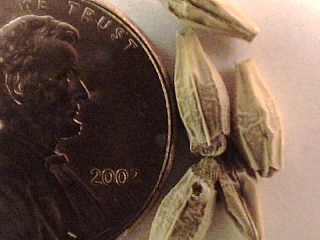
Abb.: Gerstenkörner [Bildquelle:
http://www.boone.k12.ia.us/activities/ffa/cdeweb/agronomy/id/cropid/bcs.html.
-- Zugriff am 2004-03-05]
15. Eating nothing but lotus-fibres (for a whole month) is called the Mûlakrcchra (root penance).
16. Eating nothing but Bel fruit [Aegle marmelos] (for a whole month) is called the Shrîphalakrcchra. (Bel fruit penance).
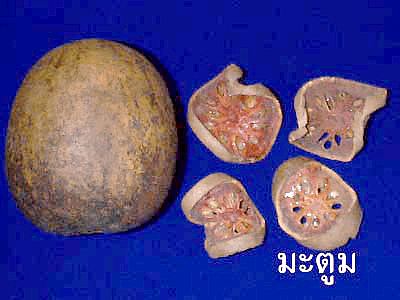
Abb.: Bael fruit (Aegle marmelos) [Bildquelle:
http://www.pharm.chula.ac.th/vichien/crude-45/carbohydrate/aegle.htm. --
Zugriff am 2004-03-05]
17. Or1 (this penance is performed) by (eating) lotus-seed.
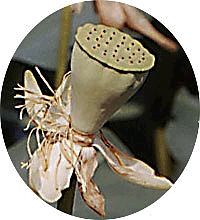
Abb.: Lotusfrucht mit Samen [Bildquelle:
http://www.flowerpictures.net/lotus/lotus_life.htm. -- Zugriff am
2004-03-05]
1According to Nand., the particle vâ, 'or,' here indicates another alternative, that of performing this penance, with Amalakas (Emblica Officinalis Gaertn.)
Abb.: Amlaka [Bildquelle: http://www.herbscancure.com/amla.htm. -- Zugriff am 2004-03-05]
18. A total fast for twelve days is called Parâka.
19. Subsisting for one day on the urine and faeces of a cow, milk, sour milk,
butter, and water
in which Kusha grass [Poa cynosuroides = Desmostachya bipinnata]
has been boiled, and fasting the next day, is called
Sântapana (the tormenting penance).
20. Swallowing (the same six things, viz.) cow-urine and the rest, each for one day, is called Mahâsântapana (the particularly tormenting penance).
21. Swallowing each for three days is called Atisântapana (the extremely tormenting penance).
22. Swallowing oil-cakes, foam of boiled rice, buttermilk, water, and ground barley (each for one day), with a fasting day between (every two days), is called Tulâpurusha (a man's weight).
23. Drinking water boiled with Kusha grass [Poa cynosuroides = Desmostachya bipinnata] , leaves of the Palâsha [Butea frondosa] and Udumbara [Ficus glomerata = F. racemosa]. trees, of lotuses, of the Shankhapushpî plant [Chrysopogon aciculatus = Andropogon aciculatus], of the banyan tree [Ficus benghalensis], and of the Brahmasuvarcalâ [Clerodendrum indicum = C. siphonanthus] plant, each (for one day), is called Parnakrcchra (leaves penance).
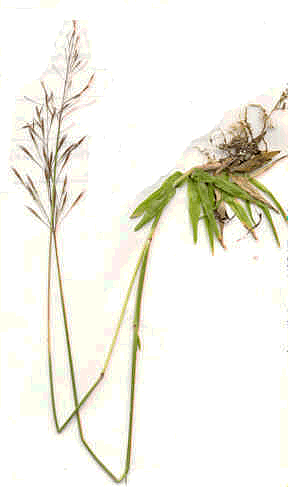
Abb.: Shankhapushpî plant [Chrysopogon aciculatus = Andropogon aciculatus]
[Bildquelle:
http://www.hear.org/pier/images/chacip4.jpg. -- Zugriff am 2004-03-05]
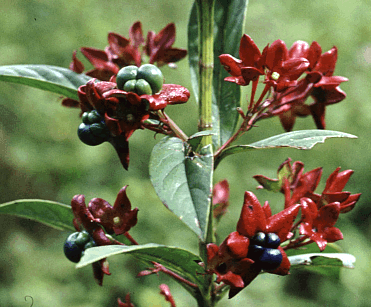
Abb.: Brahmasuvarcalâ (Clerodendrum indicum = C. siphonanthus)
[Bildquelle:
http://botany.cs.tamu.edu/FLORA/perdeck/vin_168.jpg. -- Zugriff am
2004-03-05]
24. Let a man perform all those penances after having shorn his hair and his beard, and let him bathe at morning, noon, and evening every day, lying on a low couch, and restraining his passions,
25. And let him (while engaged in performing them) avoid to converse with women, Shûdras, or outcasts, and let him constantly, to the best of his ability, mutter purifying Mantras and make oblations in the fire.
1. Now follows the Cândrâyana. (lunar penance).
2. Let a man eat single mouthfuls (of food) unchanged in size1;
1. 'Unchanged in size' means 'of that size precise, which the law prescribes.' Yâjnavalkya (III .324) states that each daily portion must have the size of a peacock's egg, and Gautama (XXVII, 10) prescribes that the size of a mouthful shall be such as not to cause a distortion of the mouth in swallowing it. (Nandapandita)
3. And let him during the moon's increase add (successively) one mouthful (every day, so as to eat one mouthful on the first day of the moon's increase, two mouthfuls on the second day, and so on; fifteen mouthfuls on the day of full moon), and during the wane of the moon let him take off one mouthful (every day, so as to eat fourteen mouthfuls on the first day of the moon's wane, thirteen mouthfuls on the second, and one mouthful on the fourteenth day of the moon's wane), and on the day of new moon let him fast entirely : thus has the barley-shaped Cândrâyana been described.
4. Or the ant-shaped Cândrâyana (may be performed).
5. That Cândrâyana is called 'ant-shaped' in which the day of new moon is placed in the middle.
6. That one is called 'barley-shaped' in which the day of full moon is placed in the middle.
7. If a man eats for a month eight mouthfuls a day, it is (the penance called) Yati-Cândrâyana (an hermit's Cândrâyana).
8. Eating (for a month) four mouthfuls each morning and evening is (the penance called) Shishu-Cândrâyana (a child's Cândrâyana).
9. Eating anyhow1 three hundred minus sixty mouthfuls a month is the penance called Sâmânya-Cândrâyana (general Cândrâyana).
1 'Anyhow,' i. e. otherwise than ordained above, as e. g. eating four mouthfuls on one day, and twelve on the next day; or fasting on one day, and eating sixteen mouthfuls on the following day; or fasting for two days, and eating twenty-four mouthfuls on the third day; or fasting for three days, and eating thirty-two mouthfuls on the fourth day. (Nandapandita)
10. After having performed this penance, in a former age, the seven holy Rshis, Brahman, and Rudra acquired a splendid abode, O Earth.
1. Now if a man feels his conscience charged with some guilty act (such as performing a sacrifice for, or accepting a gift from, unworthy persons, or eating excrements) committed by himself (or if his onscience tells him that he has done more evil than good, or if he thinks himself less pure than others), let him boil a handful of barley-gruel for the sake of his own spiritual welfare.
2. Let him not make the (customary) Vaishvadeva offering1 after that.
3. Neither must he make the Bali2 offerings.
1, 2 Regarding the regular oblations which have to be offered at meal times &c. to the Vishvedeva's and to all beings (bhûtâni), see LIX, 22, 24; LXVIII, 1-22.
4. Let him consecrate with Mantras1 the barley, before it has been put to the fire, while it is being boiled, and after it has been boiled.
1 The Mantras are given below, 17-22
5. Let him watch the barley, while it is being boiled (muttering at the same time the following Mantra):
6. 'Soma, who is the highest priest among priests (gods), leader among the wise, Rshi among bards, the falcon among rapacious birds, the Svadhiti tree among trees, trickles murmuring through the filter.'1With these words he must fasten blades of Kusha grass [Poa cynosuroides = Desmostachya bipinnata] (round the neck of the kettle).
1 ' Rg-veda IX, 96, 6. Regarding the translation of this verse, see Dr. Zimmer's remarks, Altindisches Leben, p. 207.
7. The pulse having been boiled, he must pour it into another vessel and eat it.
8. Let him help himself to it, while muttering the Mantra, 'The gods, who have sprung up in the mind and satisfy the mind, who are gifted with great energy, and whose father is Daksha, shall protect and help us. To them be Namah (adoration), to them be Svâhâ (hail).'1
1 Taittirîya Samhitâ I, 2, 3, 1. See also Vâjasaneyi Samhitâ. IV, 11, &c.
9. Then, after having sipped water, let him seize the centre (of the vessel) and mutter the Mantra :
10. "Be satisfied in our stomach, O ye waters, and ye barley-corns, after having been bathed ; they shall be salubrious to us, conferring bliss, causing health, divine, causing immortality, and increasers of Rta (truth and justice)."
11. One desirous of wisdom (must perform this rite) for three days;
12. A sinner, for six days.
13. Any of the mortal sinners (killers of a Brahmana, stealers of gold, and the rest) becomes purified by swallowing it for seven days.
14. Swallowing it for twelve nights effaces even sins committed by an ancestor;
15. Swallowing it for a month, every sin (whether light or heavy, and whether committed by himself or by an ancestor).
16. And so does swallowing barley-corns dissolved in the excrements of a cow for twenty-one days (efface every sin).
17. "Thou art barky, thou the king of grains, thou water mixed with honey; the Rshis have proclaimed thee an expeller of every kind of guilt and an instrument of purification.
18. "You are clarified butter and honey, O ye barley-corns; you are water and ambrosia, O ye barley-corns. May you efface whatever sinful acts I have committed :
19. "Sins committed by words, by acts, and by evil thoughts. Avert distress and ill-fortune from me, O ye barley-corns.
20. "Purify food licked at by dogs or pigs, or defiled by leavings (of food), and (purify me from the stain) of disobedience towards mother and father, O ye barley-corns.
21. "Purify for me food given by a multitude of persons, the food of a harlot, or of a Shûdra, food offered at a Shrâddha, food rendered impure by the birth of a child in the house, the food of a thief, and food offered at a Navashrâddha (or new Shrâddha, which takes place on the first, third, fifth, seventh, ninth, and eleventh day after a person's demise).
22. "Purify me, O ye barley-corns, from the sin of injuring a child or of causing (a punishment) to be inflicted on some one by the king, from theft of gold (or other high crimes), from the violation of a religious duty, from performing a sacrifice for an unworthy person, and from abusing a Brahmana."
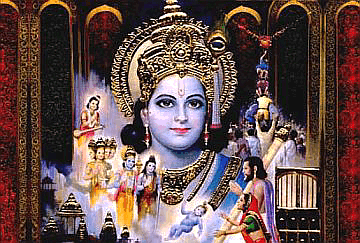
Abb.: Vâsudeva = Sohn des Vasudeva: Krishna's Birth observed by Nârada, Brahmâ, Shiva, Vishnu and
his earthly parents, Vasudeva and Devaki [Bidlquelle:
http://vahini.org/gallery/hall1/krishna10.html. -- Zugriff am 2004-03-05]
1. After having fasted during the eleventh day of the bright half of the month Margashîrsha2, let a man worship1, on the twelfth day, the venerable Vâsudeva (Vishnu).
1 'He must woiship Vasudeva either with sixteen acts, muttering one out of the sixteen verses of the Purushasukta with each single act, the first act being the invocation of the gods, and the last the dismissal of the assembled Brahmanas; or he must worship him with the " five offerings," perfumes, and the rest, muttering at the same time the "twelve syllables " (Om namo bhagavate vâsudevâya, "Om, adoration to the venerable Vâsudeva").' (Nandapandita)
2Margashîrsha Z November/Dezember. Margashîrsha ist der Monat Vishnus, siehe Bhagavadgîta 10, 35: "Unter den Monaten bin ich [Krshna] der Margashîrsha."
2. (He shall worship him) with flowers, incense, unguents, lamps, eatables (such as milk), and repasts given to Brahmanas.1
1 'He must worship him with those offerings and with burnt-oblations. The burnt-oblation, which must consist either of sesamum, or of barley, or of clarified butter, has to be accompanied by the recitation of the Purushasûkta [Rgveda X,90] or of the " twelve syllables." [Om namo bhagavate vâsudevâya] (Nandapandita)
3. By performing this rite (on the twelfth day of the bright half of every month, from the month Margashîrsha1 to the month Kârttika1) for one year, he is purified from every sin.
1Margashîrsha Z November/Dezember, Karttikâ Z Oktober/November, d.h. ein ganzes Jahr.
4. By performing it till he dies, he attains Shveta-dvîpa1 (' the white island,' the abode of Bhagavat).
1 "SHVETADVÎPA. An island. It was on this island that Mahâvishnu performed his austere tapas for obtaining "Brahma Vidyâ". It is situated on the northern side of the ocean of milk. It is 32,000 miles above Meru mountain. The inhabitants of Shvetadvîpa are without the sense organs. They do not take food They are rich in "Jnâna" (knowledge). Their bodies give out perpetual fragrance. These sinless people are of white complexion. Their bodies and bones are as hard as Vajrâyudha. Their heads are as broad and flat as umbrellas and their voice as loud as thunder. Each of them has four arms and sixty teeth. All of them worship Shiva. ("M.B. Shânti Parva. Dâkshinâtya Pâtha, Chapter 335)." [Quelle: Mani, Vettam [Vettammâni] <1921 - >: Puranic encyclopaedia : a comprehensive dictionary with special reference to the epic and puranic literature. -- 1. ed. in engl.. - Delhi : Motilal Banarsidas, 1975. - VIII, 922 S. -- ISBN 0-8426-0822-2. -- Originaltitel: Purananighantu (1964). -- S. 780.]
5. By performing it for a year on each twelfth day of both halves of a month, he attains heaven.
6. By performing it (within the same intervals), till he dies, (he attains) the world of Vishnu1.
1 Vishnuloka = Vaikuntha. Befindet sich auf der Spitze des Berges Meru
Abb.: Vaikuntha, die Welt Vishnus [Bildquelle: http://www.artiststudiosonline.com/vaikuntha.html. -- Zugriff am 2004-03-06]
7. The same (heavenly rewards are gained by him who performs this rite) on each fifteenth day (after having fasted during the fourteenth).
8. If he worships (according to the latter rite) Keshava (Vishnu) who has become one with Brahman, on the day of full moon, and Keshava absorbed in meditation, on the day of new moon, he will obtain a great reward.
According to Nandapandita, the two forms of Vishnu mentioned here must be considered as two separate deities, the one having to be invoked with the words 'Adoration to Brahmakeshava,' and the other with the words 'Adoration to Yogakeshava'. 'A great reward' he interprets by 'a shape identical with that of Brahman.'
Abb.: Keshava / Malerei von ©Johannes Ptok [Bildquelle: http://www.consciousart.de/galleries/painting/ptok.php. -- Zugriff am 2004-03-05]
9. If in a year on a day of full moon the moon and the planet Jupiter are seen together in the sky, it is called a great full moon.

Abb.: Mond, Venus, Jupiter und Mars in Konjunktion [Bildquelle:
http://www.mo-biz.com/emdso/interplanetary/Moon_Venus_Mars_and_Jupiter.jpg.
-- Zugriff am 2004-03-06]
10. Gifts, fasts, and the like are declared to be imperishable on that day. The same is the case if a conjunction with the asterism Shravana falls on the twelfth day of the bright half (of any month).
1. Let a man make a hut of leaves in a forest and dwell in it;
2. And let him bathe (and perform his prayers) three times a day;
3. And1 let him collect alms, going from one village to another, and proclaiming his own deed ;
1 Nandapandita quoting Gautama XXII, 5 takes the particle ca, 'and,' to imply that he should also make way for any Ârya whom he meets.
4. And1 let him sleep upon grass :
1 The particle ca here means, according to Nandapandita, that he ought to remain chaste, as ordained by Gautama, XXII, 4.
5. This is called a Mahâvrata (great observance).
Von allen Sûtras und Smrtis findet sich ausführlichste zusammenhängende Behandlung der Bußen für Essensvergehen im 51. Kapitel der Vishnusmrti.
Die folgende Übersetzung stammt von Julius Jolly <1849 - 1932>:
The Institutes of Vishnu / translated by Julius Jolly. -- Oxford : Clarendon Press, 1880. xxxvii, 316 S. -- (The sacred books of the East ; v. 7)
Ausführliche Erklärungen zu den genannten Pflanzen und Tieren findet man in Kapitel 11,2 und Kapitel 11,3.
1. A drinker of spirituous liquor must abstain from all religious rites and subsist on grains separated from the husk for a year.
2. If a man has (knowingly) tasted any
he must perform the Cândrâyana penance.
3. Likewise, if he has (knowingly) eaten
4. In all those cases men belonging to a twice-born caste have to be initiated a second time, after the penance is over.
5. On their second initiation, the tonsure, the girding with the sacred string, the wearing of the staff, and the begging of alms shall be omitted.
6. If a man has (unawares) eaten meat of a five-toed animal, with the exception of
he must fast for seven days.
7. If he has eaten the food
he must subsist upon milk for seven days.
8. And1 (if he has eaten) the food
1 ''As shown by ca, "and," other persons who have a dishonourable piofession, such as fishermen, have also to be understood." (Nandapandita)
9 Or
1 Abhishasta means 'accused of a heinous ciime,' i.e. 'a person of bad repute.' (Nandapandita) See also Dr. Bühler's notes on Âpastamba I, 9, 24, 6, and on Gautama XVII, 17.
10. Or
11. Or
12. Or
13. Or
14. Or (the food)
1 This is the usual meaning of the term rangâvatârin. Nandapandita explains it by 'wrestlers and the like '
15. Or
16. Or (the food)
17. Or (food)
1 Nandapandita considers the teim patatrin to refer to crows only in this place. Kullûka (on Manu IV, 208) interprets it by 'crows and the like.' See also Gautama XVII,10.
18. Or
19. Or the food
20. Or
21. After having (unawares) eaten the flesh, of any sort of fish, excepting
he must fast for three days.
22. Likewise, after having (unawares) eaten the flesh of (any other) aquatic animal (such as the alligator, or the Gangetic porpoise).
23. After having (knowingly) drunk water from a vessel in which spirituous
liquor had been kept, he must drink for seven days milk boiled together with the
Shankhapushpî [Chrysopogon aciculatus = Andropogon aciculatus]
plant.
24- After having (knowingly drunk water) from a vessel in which an intoxicating
beverage had been kept, (he must drink the same) for five days.
25. A Soma-sacrificer, who has (unawares) smelt the breath of a man who had been drinking spirituous liquor, must plunge into water, (suppress his breath) and mutter the Aghamarshana three times, and eat clarified butter afterwards.
26. For eating (designedly) the flesh
he must perform the Cândrâyana penance.
1 Nandapandita argues fiom a passage of Pracetas, that the flesh of the following other animals, dogs, jackals, cocks, boars, carnivorous animals in general, Gangetic porpoises, apes, elephants, horses, tame hogs, cows, and human beings, is also implied here. But if that were the case, Sûtra 26 would be partly a mere repetition of, and partly opposed to, the rules laid down in Sûtras 33 and 22.
27. Likewise, for eating (knowingly)
1 Nandapandita. infers from a passage of the Brahma-purâna, that the use of the particle ca, further implies a prohibition to eat the flesh on the back, or flesh which had been interred in the ground, or covered with earth, fried meat, and the flesh of the uterus.
28. For eating (unawares) the flesh
he must perform the Taptakrcchra.
29. For (knowingly) eating
he must fast for three days.
30. Likewise, for eating (unawares the flesh
31. For eating (unawares) the flesh of any bird, excepting
(he must fast) for a day and a night.
Vgl. die gut illustrierte Übersicht über 1330 Vogelarten Indiens: Kazmierczak, Krys [Text] ; Berlo, Per van [Ill.]: A field guide to the birds of the Indian subcontinent. -- New Haven : Yale University Press, ©2000. -- 352 S. : Ill. -- . ISBN 0300079214.
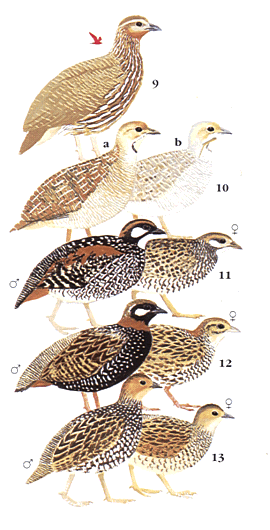
Abb.: Indische Vertreter der Gattung Francolinus [Bildquelle: Kazmierczak, Krys
[Text] ; Berlo, Per van [Ill.]: A field guide to the birds of the
Indian subcontinent. -- New Haven : Yale University Press,
©2000. -- 352 S. : Ill. -- . ISBN
0300079214. -- S. 93]

Abb.: Lâvaka = Coturnix chinensis [Bildquelle:
http://www.fort.usgs.gov/resources/education/bts/impacts/birds.asp. --
Zugriff am 2004-03-06]
32. For eating (knowingly) insects (ants and others), he must drink for one day (water in which the plant) Brahmasuvarcalâ [Clerodendrum indicum = C. siphonanthus] (has been boiled).
33. For eating (unawares) the flesh of dogs, he must perform the same penance1.
1 'And he must perform the Sântapana penance mentioned in the next Sûtra, as the use of the particle ca implies.' (Nandapandita)
34. For eating (unawares
he must perform the Sântapana penance.
35. For eating (unawares) stale food, other than
he must fast (for one day).
36. Likewise, (for eating unawares)
37. Also,
if those dishes have not been announced to the gods first;
1 Nandapandita interprets this term by utkarikâ, which, according to Wilson, is a sort of sweetmeat made with milk, treacle, and clarified butter. Kullûka (on Manu V, 7) has a somewhat different interpretation.
38. Also, for tasting the milk of any animal, save the milk of
1 Nandapandita infers from the use of the particle ca that the same penance is ordained for tasting any other production of those animals, as e.g. their excrements.
39. Also, (for tasting the milk) of those animals (cows and the rest) within ten days after their giving birth to a young one.
40. And (for tasting) the milk
1 Sandhinî means 'a cow that has just taken the bull,' or ' a female animal that gives milk once a day,' or ' a cow that is milked by the calf of another cow.' (Nandapandita) Haradatta (see Âpastamba I,5,17,23; Gautama XVII, 25) interprets it by .'an animal giving milk while big with young.' For other interpretations, see the Petersburg Dictionary.
2 'The particle ca. indicates that animals bearing twins have also to be included in this prohibition.' (Nandapandita) See Gautama loc. cit.
41. And (for tasting the milk of a cow) that has been feeding upon ordures.
42. And (for tasting) any such food as has turned sour (but not that which is sour by nature, like sorrel), except sour milk (and what is made with it).
43. A student, who partakes (unawares) of a Shrâddha repast, must fast for three days.
44. And he must remain in water for a whole day afterwards).
45. If he eats honey or meat (at any time), he must perform the Prâjâpatya penance.
46. If any one eats (unawares) the leavings of the food
he must drink water in which the Brahmasuvarcalâ [Clerodendrum indicum = C. siphonanthus] plant has been boiled.
47. For eating (unawares) what has been left by a dog, he must fast for one day, and drink Pancagavya [Ghee gekocht mit den fünf Produkte der Kuh: Milch, Sauermilch, Butter, Urin, Kuhfladen, siehe Cârakasamhitâ 68.2.1.] (afterwards).
48 For tasting (knowingly) the excrements of five-toed animals (excepting human excrements), he must (fast) for seven days (and drink Pancagavya on the eighth).
49. If one (not a student) eats (unawares) of a Shrâddha repast consisting of raw food, he must subsist on milk for seven days.
50. If a Brahmana eats what has been left by a Shûdra, (he must also subsist on milk) for seven days.
Nandapandita explains that he should drink Pancagavya alternately with milk. This explanation extends to the following Sûtras also (up to Sûtra 56). He further argues from another Smriti text that the term Shûdra means 'Shûdras and women' here.
51. If he eats what has been left by a Vaishya, (he must subsist upon milk) for five days.
52. If he eats what has been left by a Kshatriya, (he must subsist upon milk) for three days.
53. If he eats what has been left by another Brahmana, (he must subsist upon milk) for one day.
54. If a Kshatriya eats what has been left by a Shûdra, (he must undergo the same penance) for five days.
55. If he eats what has been left by a Vaishya, (he must undergo it) for three days;
56. And so must a Vaishya, if he eats what has been left by a Shûdra.
57. For (knowingly) eating (undressed) food, which has been left by a Candâla1 (or Shvapaca, or other member of the seven lowest castes), he must fast for three days.
1 Candâlas sind die verachtetste soziale Gruppe, sie sind u.a. Henker. Shavapaca = "Hundekocher", der Name zeigt die ganze Verachtung. Die tiefsten Mischstände entstehen aus hypergamen Verbindungen (höherständische Frau + niederständischer Mann). Es sind: Âyogava (Schausteller), Pukkasa (Jäger) Mâgadha (Marktschreier), Candâla (henker), Vaidehaka (Zuhälter), Sûta (Pferdeknechte). Siehe Vishnu XVI.
58. For (unawares) eating dressed food (left by such), the Parâka penance is ordained.
59. Let no Brahmana ever eat (the flesh of) beasts which has not been consecrated with Mantras ; but if it has been consecrated with Mantras, he may eat it, following the eternal rule (laid down in the Veda).
60. As many hairs as the beast has, which he has slain in this world, for so many days will the killer of a beast for other purposes than a (Shrauta or Smarta) sacrifice, suffer terrible pangs in this world and in the next1.
1 My translation follows Nandapandita. It is, however, doubtful, whether the reading is correct; see Manu V, 38.
61. It is for sacrifices that beasts have been created by the Self-existent (Brahman) himself. Sacrificing causes the whole universe to prosper ; therefore is the slaughter (of beasts) for a sacrifice no slaughter.
62. The sin of him who kills deer for the sake of gain, is not so great (and visited less heavily) in the world to come, than the sin of him who eats meat which has not been offered to the gods.
This is because the former kills animals in order to support his family, whereas the latter eats meat merely in order to tickle bis palate. (Nandapandita)
63. Plants, cattle, trees, amphibious animals, and birds, which have been destroyed for the purposes of sacrifice, obtain exaltation in another existence (in which they are born as Gandharvas, or other beings of a high rank).
64. When honouring a guest, at a sacrifice, or when worshipping the manes, or the gods, a man may slay cattle, but not otherwise on any account.
65. That twice-born man who, knowing the exact truth (promulgated) in the Veda, slays cattle for the sacrifices (ordained in the Veda), will convey himself and the cattle (slain by him) to a blissful abode.
66 A self-controlled1 man of a twice-born caste, whether he be a householder, or be dwelling with his spiritual teacher, or in the forest, must never slay an animal in opposition to the precepts of the Veda, even in cases of distress.
1 Nandapandita interprets the term âtmavân by samnyâsî, 'an ascetic, or member of the fourth order,' apparently because the first three orders are mentioned in this Shloka. I have followed Kullûka's interpretation (on Manu V, 43).
67. That slaughter which is in accordance with the precepts of the Veda, and has been fixed for this world of movable and immovable creatures, should be considered as no slaughter at all; because it is from the Veda that law shines forth.
68. He who hurts animals that do not hurt any one, merely in order to afford pleasure to himself will never obtain happiness, whether living or dead1.
1 'But it is no sin to kill tigers or other beasts of prey.' (Nandapandita)
69. He who gives no living creature intentionally the pain of confining or killing (or hurting) it, from benevolence towards all (creatures), will enjoy everlasting happiness.
70. Whatever he thinks of, whatever he strives for, and whatever he desires in his heart, all that is easily obtained by him who does not injure any created being.
71. Meat cannot be obtained without injuring an animal, and the murder of
animals excludes the murderer from heaven, therefore must meat be avoided.
72. Reflecting upon the origin of flesh1 and upon the (sin of)
hurting or confining animated creatures, he must abstain from animal food of any
kind.
1 'The human soul is enveloped in six sheaths, three of which come from the father, and three from the mother. The three that come from the mother are skin, flesh, and blood. Now .flesh is said in the Shruti to be derived from the menstrual discharge, and the latter is one of the species of forbidden food.' (Nandapandita)
73. He who transgresses not the law and eats not flesh like a Pishâca1, is beloved by men and remains free from disease.
1 "PISHÂCHAS (mas.), PISHÂCHÎ (fem.). Fiends, evil spirits, placed by the Vedas as lower than Rakshasas. The vilest and most malignant order of malevolent beings. Accounts differ as to their origin. The Brâhmana and the Mahâ-bhârata say that they were created by Brahmâ, together with the Asuras and Rakshasas, from the stray drops of water which fell apart from the drops out of which gods, men, gandharvas, &c., had been produced. According to Manu they sprang from the Prajâpatis. In the Purânas they are represented as the offspring of Kashyapa by his wife Krodhavasâ, or Pishâchâ, or Kapishâ." [Quelle: Dowson, John <1820-1881>: A classical dictionary of Hindu mythology and religion, geography, history, and literature. -- London, Trübner, 1879. -- s.v. ]
74. He who gives his consent to the killing of an animal, he who cuts it up, he who kills it, the purchaser and the seller, he who prepares it, he who serves it up, and he who eats it, all these are denominated slaughterers of an animal.
75. There is no greater sinner than he who, without giving their share to the manes and to the gods, wants to increase his own flesh with the flesh of another creature.
76. Those two, he who performs a horse-sacrifice annually for a hundred years and he who does not eat meat, shall both obtain the same recompense for their virtue.
77. By eating (wild rice or other) sacred fruits or roots, and by living upon such grains as are the food of hermits, a man does not reap so high a reward as by avoiding meat.
78. (An eater of flesh must say within himself), 'Me he (mâm sa) will eat in the next world, whose flesh I am tasting here.' This, say the learned, is the derivation of the word flesh
ENDE DES SKRIPTUMS